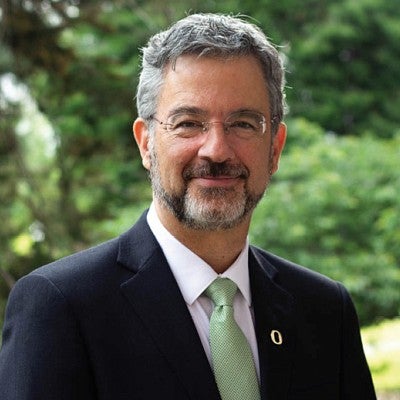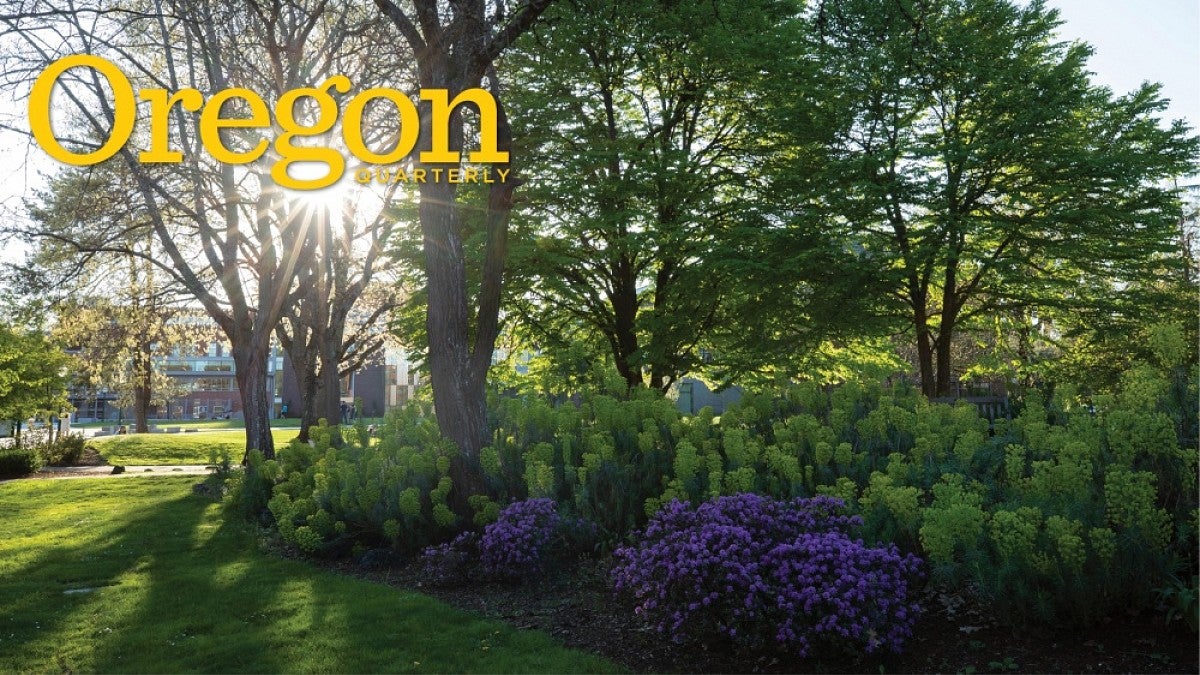At first glance, a recent string of successes at the University of Oregon may seem fundamentally unrelated: the launch of a data science major with about 50 students—double the projection. A landmark $4.7 million Mellon Foundation grant to examine environmental futures across various academic fields. New student startups in maternal health, sustainable skin care, digital currency, and more, all finalists in the Provost Innovation Challenge. The completion of a reimagined Hayward Field—outwardly, a gleaming symbol of UO excellence in sport, and inside, the home of world-class laboratories for studying human performance.
What ties them together? They exemplify a university that is drawing on its strengths to better serve the state, region, and world.
One of the principal architects of this idea—building on strengths to maximize service—is Patrick Phillips, who became provost in 2019.
The university’s chief academic officer has launched a campus-wide effort to build on strengths in academia, with initiatives in data science, diversity, environment, innovation, and sport and wellness. The goal: enabling more of the knowledge and research generated in labs and classrooms to reach all Oregonians.
“We must move forward and be more than just the University of Oregon,” Phillips says. “We must redouble our efforts to be a university for Oregon, and for our region and the world. We have an opportunity to draw together strengths in a wide variety of areas and think about how we can do both the internal work of the university and fulfill our mission as a public institution to make sure that we’re contributing to a greater good.”
A ROADMAP TO IMPACT

Backed by donor support, the provost’s initiatives align research and scholarly strengths with student interests to enhance the UO’s academic impact. They are founded on the commitment of the university to fulfill its mission as a public institution and address the problems of our time.
The Data Science initiative, which capitalizes on world-renowned faculty, will prepare students to understand data and chart careers relevant to the drive in the marketplace to make better decisions, faster. Faculty members are engaging with researchers statewide to leverage data science to address society’s biggest challenges, from curing cancer to fighting global climate change.
With the Environment initiative, the university is responding to the crisis of climate change with a focus on interdisciplinary pursuits that meet the desires of an engaged student body and the higher calling of a public institution to help address societal ills.
With the Innovation initiative, the UO will build on its identity as a place where research is increasingly connected to impact, as exemplified by the Phil and Penny Knight Campus for Accelerating Scientific Impact. University researchers are developing new ways to expand the role of the UO as a major driver of economic activity in the state.
The Sport and Wellness initiative will build on research in healthy living and environmental quality to help residents of the state live longer, healthier lives, while applying professional expertise to the state’s important sports product industry.
Spurred by last year’s upswelling of awareness of racial injustice, the Diversity initiative is an affirmation of the UO’s intent to use research and funding to address the complex realities of racial inequity. This includes long-simmering tensions around the experience of underrepresented groups in majority-white Oregon, according to Phillips.
“Last year’s events—with all the lives lost, the pandemic’s disproportionate impact on BIPoC communities, and the polarizing election cycle—advanced our desire to be an antiracist campus,” he says. “All of these pushed us to ask ourselves: What’s our role as an institution to not only be antiracist in how we conduct ourselves, but in how we are bringing our scholarly and educational work to bear on making our communities antiracist?”
RELATED LINKS
For each of these initiatives, the Office of the Provost has sponsored listening sessions across campus to gain a broader understanding of opportunities and shortcomings. Faculty members and other participants are identifying where, and how, strategic investments in faculty hires, research, and curriculum will improve inclusiveness and harness academic power.
WEAVING THE THREADS
Phillips’s career is evidence of his unwavering belief in the power of partnerships to make change.
As a distinguished professor of biology and Philip H. Knight Chair who has studied genetics and evolution at the UO for two decades, Phillips has run his lab as an integrated system in which scientists with diverse backgrounds work on their own projects and also help each other to implement innovative approaches to solving complex problems.
He was tapped to serve as acting director of the Knight Campus, where his ability to build consensus was essential to liftoff for this world-class research campus. His success there prompted President Michael Schill to name him provost.
In his new role, Phillips is determined to break down barriers to collaboration and, through the initiatives, create a framework that unites UO faculty members to address critical concerns.
“Everything that we’re doing is organic to the University of Oregon. It’s a chance to draw those threads together to make the entire tapestry of the university even richer and stronger,” Phillips says. “This is not at all a change in focus in what the university is or does. In many respects, it’s a distillation of just a few facets of who we are that can serve as initial focal points that fully illustrate what we can become when we fulfill all aspects of our mission: the educational, the research, and the public impact role of a modern university.”
TODAY AND TOMORROW
The initiatives are developing at different paces, each now in the hands of engaged faculty members. They’re examining hires, partnerships, courses, and programs that will compound university strengths in the five areas while inspiring the next generation of students.
Phillips is also enthusiastically inviting input from alumni, who he describes as the UO’s biggest influence in the world.
“What is important to our alumni is important to what we’re doing,” he says. “Rather than us saying, ‘This is the way students should be,’ it’s good to start by asking the question, ‘What does the world want our students to be?’ Because that will help our students in the end.”
His approach resonates with Whitney Wagoner, director of the Warsaw Sports Marketing Center, an instructor of sports business, and a member of the steering committee for the sport and wellness initiative. She says the university’s ambitious reimagining of the five academic areas will redefine the rules of engagement in support of collaborative work.
“There’s an openness to talk about productivity in a more diverse way, and that should make our colleagues eager to want to get involved and work across disciplines in a way where they maybe have more degrees of freedom to do so than we’ve had in the past,” Wagoner adds. “It’s been really valuable just to be given the space to gather and listen to our super-smart colleagues talk about the great work they do. There is energy and momentum and wind at our backs, because we’re already doing great things.”
As provost, Phillips knows he does not have the luxury of slowing down. Early in his tenure, he saw the value and volume of work being done in critical areas across campus but heard from faculty members and staff that institutional “silos” had hindered collaboration on the academic work’s impact in the world. He was determined to break down barriers and, through the initiatives, create a new framework in which UO’s stellar faculty can work together to solve problems.
Says Phillips: “My philosophy is always that we’re better together. In bringing together the different parts of the university, sometimes we’ll identify gaps; we’ll realize, if we did this thing, then that would really knit these areas together and allow us to do something that is really unique, interesting, and transformative.”
—By Anna Glavash Miller, MS ’18 (journalism), staff writer for the Office of the Provost Communications
Campus photo by Julia Wagner, BS '21 (public relations), University Communications
Phillips photo by Jesse Summers, BA '17 (Clark Honors College, journalism, advertising), University Communications
FIVE PILLARS
The UO is marshalling resources and collaborative efforts in these fields to produce greater benefit to the state and its people:
1. DATA SCIENCE: Under executive director and biology professor Bill Cresko, an undergraduate major was launched this year and a graduate program will follow soon. Through the initiative, the UO has partnered with researchers from OHSU to build a center for biomedical data science and is developing a statewide team of data scientists. The initiative played a key role in the start of the UO’s COVID-19 Monitoring and Assessment Program, which has provided tens of thousands of tests to the university and community.
2. DIVERSITY: An engagement process for the initiative, organized by Lesley-Anne Pittard, assistant vice president for campus and community engagement, is ending. Meetings connected the Black Faculty Collective, faculty members representing Native American, Asian, Desi, Pacific Islander, and Latinx communities, and other UO groups. Engagement continues this fall with sessions enabling all UO community members to help shape the vision for the Center on Racial Disparities and Resilience. An outcome of the center will be the hiring of faculty.
3. ENVIRONMENT: Executive Director Adell Amos, Clayton R. Hess Professor of Law, is identifying all faculty members who delve into critical areas of the environment, including climate change, environmental justice, and resilience. A rigorous drive is underway to highlight research, promote events, and spur involvement across campus. In the coming months, an advisory committee will be appointed to strategically support all efforts.
4. INNOVATION: Andrew Nelson, associate vice president for entrepreneurship and innovation and associate professor of management, has been broadly engaging with interdisciplinary campus groups since summer 2020. This initiative amplifies the work of the Knight Campus, the Lundquist Center for Entrepreneurship, the Office of the Vice President for Research and Innovation, and other campus hubs for innovation.
5. SPORT AND WELLNESS: Organized by Carlyn Schreck, assistant vice president for presidential initiatives, and directed by a 10-member faculty steering committee, this initiative leverages the high profile of UO athletics, world-class sports facilities, athlete health and performance programs, and the university’s role as host of global competitions to shine a spotlight on programs in sports industry expertise, health and the human condition, and societal transformation.


